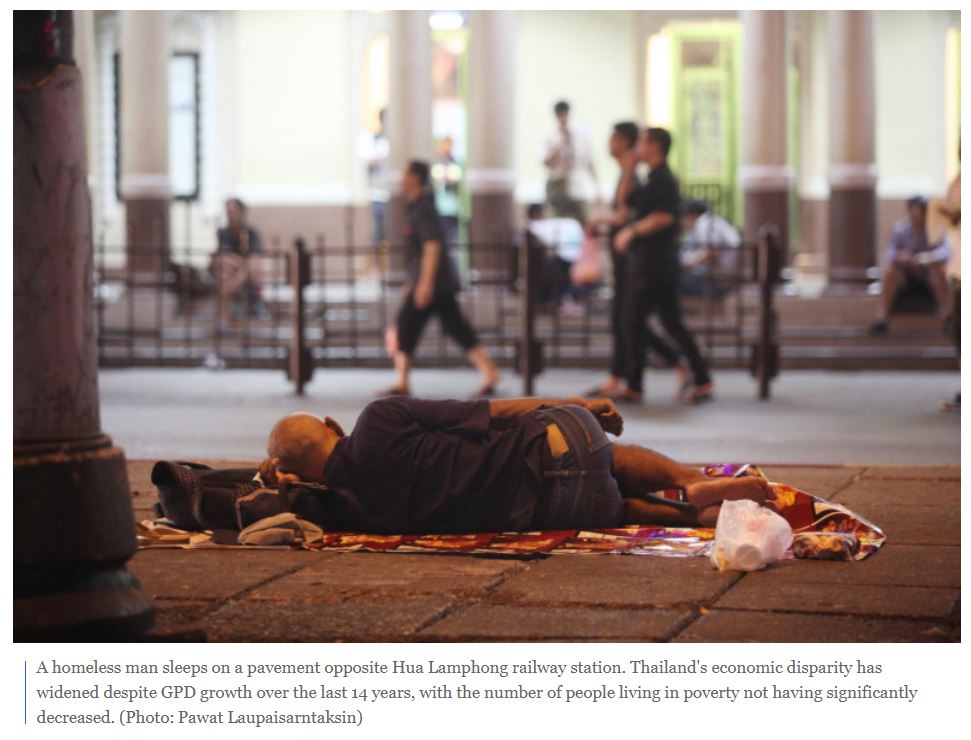Thailand’s inequality remains entrenched
The Thai economy is suffering from widening inequality, with the proportion of poor people still hovering at 6-8% of the total, particularly in the agricultural sector.
The latest study conducted by the Trade Policy and Strategy Office (TPSO), the Commerce Ministry’s planning unit, also found factors such as the transition to a digital economy, an ageing society, the pace of the economic recovery after Covid-19, and climate change all contributing to rising inequality.
Poonpong Naiyanapakorn, director-general of the TPSO, said that despite Thailand’s continuous economic growth, with GDP increasing from 7.7 trillion baht in 2008 to 10.2 trillion baht in 2021, economic inequality persists and is a significant concern that both government and private organisations would need to collaborate on in order to reduce it and ensure the sustainable development of Thailand’s society and economy, aligning with the United Nations’ (UN) sustainable development goals.
Given Thailand’s inequality status over the past three decades, the proportion of people living in poverty has decreased from 65% in 1988 to only 6.3% in 2021. However, focusing on the past 10 years (2011-2021), it is evident that the percentage of people living in poverty has not been significantly reduced but rather remained at around 6-8%, especially in the agricultural sector. More than 11% of households with a primary income from agriculture are still below the poverty line, defined as income of 2,802 baht per month per person.
Moreover, when comparing Thailand with other countries in the Asean region using the Gini coefficient, which measures income inequality, Thailand’s inequality level is similar to countries like Indonesia and Vietnam, but higher than more developed East Asian countries such as Japan and South Korea.
The TPSO analysed the factors contributing to the country’s inequality and found they originate from both internal and external sources. The transition towards a digital economy, the expansion of platform-based economies, the adoption of labour-replacing technologies, and the development of large-scale data processing (big data) have been efficient drivers of change, and are rapidly occurring at present.
These transformations offer opportunities for those who can access and benefit from technology, but they also present challenges for groups that lack access and do not have the ability to adapt to such changes. This is one of the factors that contributes to increasing economic inequality.
Furthermore, the UN predicts that from 2019 to 2050, Asia will experience the highest increase in the elderly population aged 65 and above. In this context, Thailand ranks fifth in East Asia and Southeast Asia, with an average proportion of elderly citizens to the total population of 17.2% during this period, following South Korea, Singapore, Taiwan and Macau.
According to the National Economic and Social Development Council’s report, Thailand had an estimated 13.8 million elderly citizens in 2021, accounting for 20% of the population. By the year 2040, it is anticipated that the proportion of the population that is elderly will reach 31.3%. The rising number of elderly citizens implies a decline in the labour force proportionate to the elderly and children, resulting in a higher dependency ratio for the working-age population.
At the same time, Mr Poonpong said Thailand is currently on the path to economic recovery following the pandemic. However, the economy has not been able to grow well since the contraction that occurred during the outbreak. Certain groups have been severely and persistently impacted, such as small-scale traders who lost income due to business closures during the pandemic, as well as employees and vulnerable people. These are the groups that the government should provide assistance to in order to facilitate their quick recovery and reduce long-term economic inequality, Mr Poonpong said.
Other factors such as climate change, which has led to disasters like floods and more frequent droughts, have had wide-ranging consequences.
These changes are likely to contribute to an increase in Thailand’s economic inequality, as a significant number of poor and underprivileged populations still rely on agriculture.
“Given these challenges, it is essential for government agencies, private sectors, and civil society to prepare themselves to cope with these changes,” said Mr Poonpong.
Source: https://www.bangkokpost.com/business/2599963/thailands-inequality-remains-entrenched


 Thailand
Thailand




